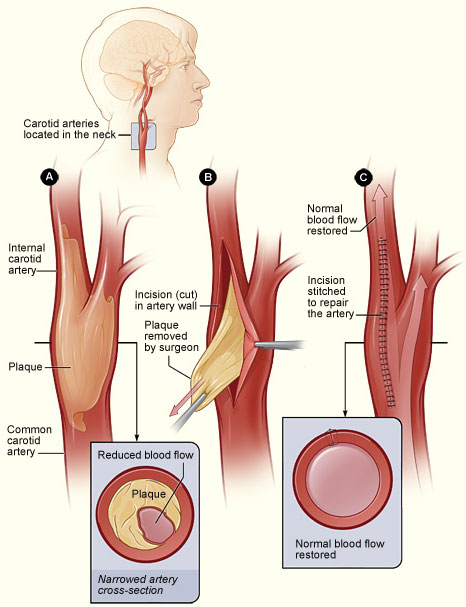Preventing Stroke and TIA with TCAR

A new minimally invasive procedure called TCAR can prevent strokes and mini-strokes caused by carotid artery disease.
Every year, 15 million people worldwide suffer a stroke, also known as a “brain attack.” The most common type of stroke occurs when the flow of blood and oxygen to the brain is disrupted by blood clots or plaque that block the carotid artery. One of these are transient ischemic attacks (TIA) or mini-strokes. In the U.S, annually 400,000 new adults are diagnosed with carotid artery disease. The disabling toll of stroke is huge. Now residents in the Gulf Coast region have a minimally invasive treatment option, call transcarotid artery revasculization (TCAR).
One prevent step everyone can take is managing your blood pressure, so it stays in a normal range. The National Institute for Neurological Disorders and Stroke (ninds.nih.gov) reminds you to “mind your risks” and learn how to keep your brain healthy by monitoring your blood pressure. To learn more, follow #Brainforlife and take an interactive quiz.
Strokes strikes fast, you should too!
Strokes and mini-stroke signs and symptoms:
- A sudden, severe headache with no known cause
- Dizziness or loss of balance
- Inability to move one or more of your limbs
- Sudden trouble seeing in one or both eyes
- Sudden weakness or numbness in the face or limbs, often on just one side of the body
- Trouble speaking or understanding speech
- The symptoms from a mini-stroke often resolve within 24 hours and should be shared with your doctor as soon as possible.
Treating TIAs and Strokes with TCAR
Until recently, the primary treatment option for severe carotid artery disease was an open surgical procedure called carotid endarterectomy. This surgical technique involves the surgeon making an incision at the front of the neck to remove the plaque and repair the carotid artery. Surgery is done to protect the brain but leaves a large incision and visible scar the length of the neck. There are risks with any surgical procedure, and in this case, doctors monitor you closely for bleeding, infection, heart attack, and cranial nerve injuries that can cause issues with swallowing, speaking, and sensation in the face. This surgery also requires an extended hospital stay.
Sacred Heart Hospital Pensacola is the first hospital in Northwest Florida and Southern Alabama to offer a minimally invasive treatment for patients at risk for stroke or TIAs, called transcarotid artery revascularization (TCAR). The vascular surgeons using a FDA-approved system to temporarily reverse blood flow in the carotid artery to reduce the chance of stroke. During the procedure, a small incision is made just above the collar bone and the surgical team accesses the carotid artery. A soft, flexible sheath is placed directly into the carotid artery and connected to a system that will reverse the flow of blood away from the brain. The redirection of blood flow prevents dangerous bits of plaque and blood clots from dislodging and traveling to the brain during the procedure, thus reducing the chance of stroke. The redirected blood is then filtered and returned through a second sheath placed in the femoral vein in the patient’s thigh. At the same time, a balloon angioplasty is done, and a tiny mesh tube or stent is inserted into the carotid artery to open the artery and stabilize the blockage. After the stent is successfully placed, flow reversal is turned off and blood flow to the brain resumes in its normal direction.
Fernando Kafie, MD, and Huey McDaniel, MD, are two vascular surgeons at Coastal Vascular and Interventional in Pensacola and part of the Sacred Heart – Heart and Vascular team. Each has significant experience doing the TCAR procedure. “TCAR gives the patient excellent neuroprotection as I would expect from carotid endarterectomy, but the procedure is far less invasive and has real benefits for the patients. They recover quickly with less pain, and the risks of both minor and major complications are significantly decreased,” explains Dr. Kafie. “TCAR represents the modernization of carotid repair.
Dr. McDaniel adds,“This advanced, minimally-invasive approach offers a much lower risk of stroke than traditional carotid stenting and has a much quicker recovery time than standard carotid surgery.”
Brenda Anthony from Pensacola, FL, had the TCAR procedure at Sacred Heart after learning that she had an 85 percent blockage in one of her carotid arteries. For her and many others, TCAR is an outpatient procedure and after recovery went home the same day. "I think it's fantastic that technology has grown so much," she said. "I'm totally pleased."
Results from clinical trials of TCAR were so compelling that the Society for Vascular Surgery, in collaboration with the Food and Drug Administration (FDA) and the Centers for Medicare and Medicaid Services, recently launched a novel program called the TCAR Surveillance Project. This program provides expanded insurance coverage of TCAR procedures for Medicare beneficiaries while allowing individual hospitals, such as Sacred Heart, to track quality benchmarks.
“TCAR is an important new option in the fight against stroke,” said Dr. Kafie. “It is particularly suited for the large portion of patients we see who are at higher risk of complications from carotid endarterectomy surgery due to age, other medical conditions, or anatomic issues. Because of its low stroke risk, we think the new procedure has the potential to become the standard of care for all patients."
For more information about Stroke Prevention Care and the TCAR procedure at Sacred Heart Pensacola, call 850-416-4842.
Last updated: August 5, 2020
